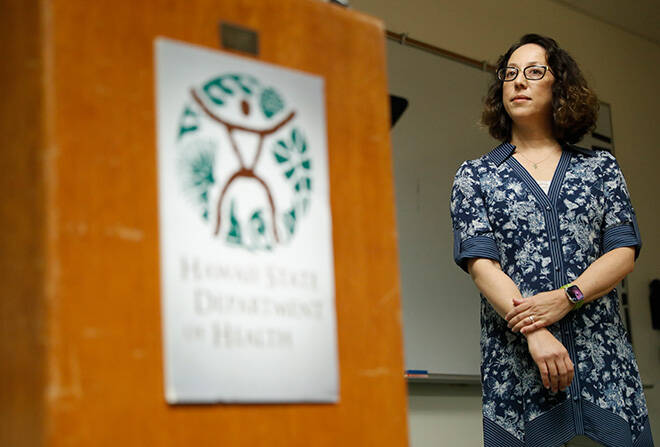Avian influenza confirmed in birds on Central Oahu property

JAMM AQUINO / JAQUINO@STARADVERTISER.COM
State epidemiologist Dr. Sarah Kemble holds a news conference Thursday to discuss the recent detection of avian influenza virus in a wastewater sample from Oahu.
State officials said today that avian influenza was detected in a backyard flock of various birds in Central Oahu, the first confirmed detection of the virus in Hawaii.
The Hawaii Department of Agriculture received a report Tuesday of at least 10 dead birds on a property that is within the area served by the Wahiawa Wastewater Treatment Plant, where a detection of avian influenza was reported earlier this week, officials said. The dead birds tested included ducks, goose and a zebra dove, and test results from necropsies confirmed bird flu.
Human illness with H5N1 avian influenza is uncommon and reported symptoms among humans infected in the United States have been mild, state Department of Health officials said in a news release.
”The current risk of transmission to Hawaii residents is low,” said State Epidemiologist Dr. Sarah Kemble. “but be smart if you do encounter sick or dead birds, livestock, or wild animals and avoid direct contact.”
H5N1 infection in humans on the mainland have been reported “almost exclusively among workers who have close contact with infected animals,” health officials said.
The most common symptoms of avian flu in humans are conjunctivitis and upper respiratory symptoms like sore throat and cough. Sustained human-to-human transmission has not been reported, according to DOH.
Don't miss out on what's happening!
Stay in touch with breaking news, as it happens, conveniently in your email inbox. It's FREE!
The Health Department is investigating potential human exposures to the sick birds, officials said, noting that antiviral treatment for avian flu in humans is available and works best when taken as soon as symptoms begin.
Highly pathogenic avian influenza, or HPAI, causes severe illness with a high mortality rate among affected birds.
After confirmation of avian influenza, agricultural officials issued a quarantine order that requires all birds on the property “be depopulated” and the area disinfected.
It is unknown how the avian influenza virus arrived in Hawaii, officials said, but the state is in the Pacific flyway for migratory birds from the continental U.S. “Strict quarantine rules have been in place to prevent bird diseases from entering the state via air transport and maritime routes,” according to the news release.
“In addition to DOH, HDOA has been collaborating closely with animal disease authorities from the U.S. Department of Agriculture who are familiar with avian influenza and its impact on wild and captive bird populations,” Dr. Isaac Maeda, HDOA’s state veterinarian, said. “We want to note that the owner of the property has been very cooperative and realizes the seriousness of the situation involving their beloved pets.”
The public can report multiple or unusual illnesses in poultry, livestock, or other wild birds or animals to HDOA’s Animal Industry Division at 808-483-7102, Monday to Friday from 7:45 a.m. to 4:30 p.m., or 808-837-8092 during non-business hours and holidays. Residents who believe they may have been exposed to sick birds or other wildlife should contact the Disease Outbreak Control Division Disease Reporting Line at 808-586-4586 for additional guidance.



